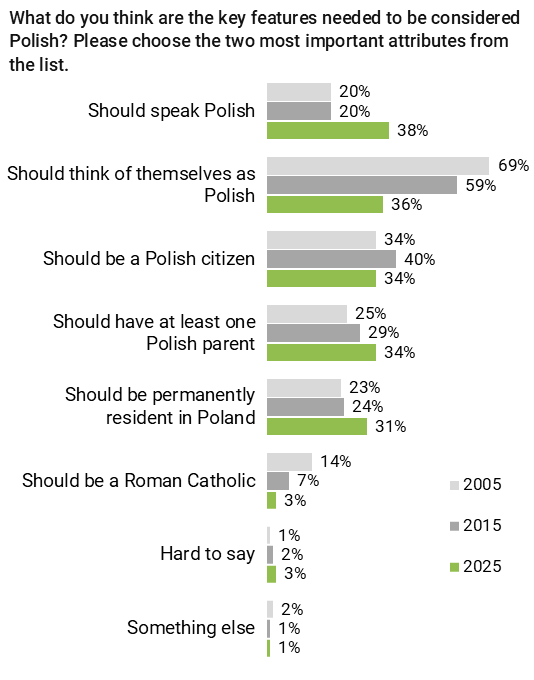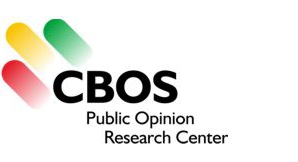10/2025
2025-04-29
Who Can Be Considered Polish?
In the latest CBOS survey respondents were asked a series of questions concerning foreigners living in Poland and the preferred ways they could integrate into Polish society. At the same time, we took the opportunity to return to a question we asked ten and twenty years ago: what criteria are essential for someone to be considered Polish? Respondents could choose the two most important attributes from a list. With the passage of time and the influx of immigrants, many aspects of what is required from would-be Poles have changed and, in general, have become more demanding.

|
The biggest change is in the importance ascribed to self-identification as a Pole. In 2005, shortly after Poland joined the EU, a clear majority of those surveyed (69%) thought that to be Polish you simply needed to feel Polish. Ten years later the percentage had dropped significantly (to 59%) but this indication was still dominant. Now in 2025, the number of respondents choosing this answer has plummeted to 36%, putting it in second place after the ability to speak Polish (38%), which in the previous two surveys was in second to last place. Polish ancestry has also risen in importance (34% compared to 25% in 2005), as has permanent residence in Poland (31% compared to 23% in 2005). The percentage of those who consider Polish citizenship to be key has dropped slightly in comparison to 2015 (from 40% to 34%), but is the same as in 2005, so there is no discernible trend here. In contrast, the importance ascribed to religious affiliation has dropped significantly, which is connected in an obvious way with the general trend of secularisation and the weakening role of the Catholic Church in Poland. In 2005, 14% of respondents considered Catholicism to be a key element of Polishness; ten years later this was 7% and now it is a bare 3%.
The liberal criterion of self-identification, which has so lost in popularity, was markedly less frequently chosen by women and younger respondents, which could be connected with the aversion these groups feel towards Ukrainian refugees, something that has come up repeatedly in CBOS surveys. This criterion was also indicated less frequently in smaller towns and villages, by people who are less educated, who think of themselves as poorer and who have unclear political opinions.
More on this subject in the CBOS report.
This ‘Current Events and Problems’ survey (418) was conducted using a mixed-mode procedure on a representative sample of named adult residents of Poland, randomly selected from the National Identity Number (PESEL) register. Respondents independently selected one of the following methods: Computer Assisted Personal Interview (CAPI); Computer Assisted Telephone Interview (CATI), respondents receiving researchers’ telephone numbers in an introductory letter from CBOS; Computer Assisted Web Interview (CAWI), where respondents filled in the online questionnaire independently, gaining access by means of a login and password provided in an introductory letter from CBOS. In all three cases the questionnaire had the same structure and comprised the same questions The survey was carried out between 6 – 16 February 2025 inclusive on a sample of 965 people (61.0% using the CAPI method, 20.5% CATI and 18.4% CAWI). CBOS has been conducting statutory research using the above procedure since May 2020, stating in each case the percentage of personal, telephone and internet interviews.





